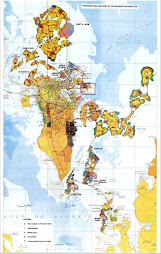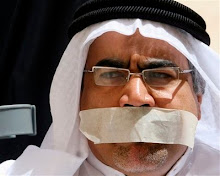Bahrain's success at risk as Iran tension rises
By David Blair in Manama
Last Updated: 2:34am GMT 02/11/2007
The glass skyscrapers dominating Bahrain's horizon are a glittering emblem of the Gulf kingdom's booming economy.
Yet this increasingly prosperous island will almost certainly be in the crosshairs of Iran's military planners as they consider their response to any American attack.
Bahrain hosts the US Fifth Fleet and serves as the headquarters for Allied naval operations across 2.5 million square miles of ocean. Moreover, about two thirds of Bahrain's people share the Shia Muslim faith of Iran's theocratic regime.
Bahrain's military importance for the West, combined with its Shia majority – found nowhere else in the Arab world save for Iraq – could render it vulnerable to attack from without and Iranian-inspired subversion from within.
All this preys on the minds of the country's leaders. After inheriting the throne eight years ago, King Hamad bin Isa al-Khalifa allowed dissidents to return from exile and introduced democratic reforms.
The Lower House of Bahrain's National Assembly is freely elected, independent newspapers are allowed to criticise the government and a booming, open economy, no longer dependent on oil, is delivering annual growth rates of seven per cent.
Yet the possibility of another Gulf war, the fourth since 1980, casts a long shadow. Sheikh Salman bin Hamad al-Khalifa, the Cambridge-educated Crown Prince, described the threat as "deadly serious".
Speaking inside his marbled palace in the capital, Manama, he added: "We need to be very well aware that this could escalate. And we think that is not advisable."
Iran officially denies any ambition to build a nuclear weapon and Arab leaders have generally refrained from publicly contradicting this assurance. But Sheikh Salman was candid about his view of Teheran's ambitions.
He advocated "talking to the Iranians while we still have a window of time.
"They don't have a bomb. They're developing one, or they're developing the capability to have it. There is still time to talk."
A new Gulf war would risk inflaming sectarian divisions among Bahrain's 800,000 people. The Sunni monarchy coexists uneasily with the island's Shia majority.
While King Hamad's democratic reforms have given the Shias a political voice – they hold 17 of the 40 seats in the Lower House –they are still excluded from sensitive posts.
The authorities fear that some Shias owe their loyalty to Iran, only 170 miles away, and few have been entrusted with membership of the defence forces or security agencies.
Mansoor al-Jamri, the editor-in-chief of al-Wasat, an independent daily, said there was a wider problem. "There is systematic discrimination against the Shias. Shias are not trusted by the state."
Tensions sparked by the war in Iraq caused Shias to be viewed with greater suspicion and "intensified" discrimination.
"Probably we are living in one of the worst periods of discrimination," said Mr Jamri. "This is poisoning Bahraini society."
The authorities have been accused of granting Bahraini citizenship to thousands of foreign Sunnis in order to counter-balance the Shia majority.
Privately, officials acknowledge the minimal representation of Shias in the armed forces. But Sheikh Salman said he would never doubt the loyalty of any Bahraini citizen. Economic success is one of the keys to national harmony, he added. But that success would be at risk if another war broke out.
Yet Sheikh Khalid bin Ahmed al-Khalifa, the foreign minister, said America had not consulted Bahrain on its approach towards Iran. "We don't want to wake up one day and see our skies dark, our sirens blaring on every street corner because of attacks here and there, planes flying and missiles falling," he said.
Information appearing on telegraph.co.uk is the copyright of Telegraph Media Group Limited and must not be reproduced in any medium without licence. For the full copyright statement see Copyright
skip to main |
skip to sidebar

خارطة البحرين الجديدة
Facebook Badge
Followers
فسيلة السنكيس
متى ما ظهرت الفسيلة - الصغير من النخل- من فوق سطح الأرض، فمن حقها أن تنمو وان تعانق السماء دون حصار أو مضايقة أو استهداف
حق الفسيلة في الحياة كحق غيرها، من المخلوقات، خاصة وإن كانت دليل أصالة شعب كشعب البحرين
--------------------------------------------------------------
صاحب المدونة: د.عبدالجليل السنكيس
ناشط، كاتب وباحث أكاديمي من البحرين
البريد الإلكتروني: asingace@gmail.com
مدونة اخرى: http://alsingace.katib.org/
هاتف:8179-3966-973+
حق الفسيلة في الحياة كحق غيرها، من المخلوقات، خاصة وإن كانت دليل أصالة شعب كشعب البحرين
--------------------------------------------------------------
صاحب المدونة: د.عبدالجليل السنكيس
ناشط، كاتب وباحث أكاديمي من البحرين
البريد الإلكتروني: asingace@gmail.com
مدونة اخرى: http://alsingace.katib.org/
هاتف:8179-3966-973+
مواقع ووصلات ذات صلة Links of Interest
صور معبرة

خارطة البحرين الجديدة






